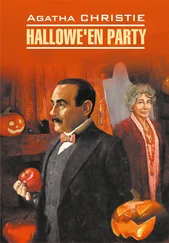‘Ah, you see that, do you?’
Sugden said: ‘Naturally. It’s been present in my mind all along. If David Lee killed his father, I don’t think it was for money. And if he was the criminal it might explain the – well, the blood-letting!’
Poirot looked at him appreciatively. ‘Yes, I wondered when you would take that into consideration. So much blood – that is what Mrs Alfred said. It takes one back to ancient rituals – to blood sacrifice, to the anointing with the blood of the sacrifice…’
Sugden said, frowning: ‘You mean whoever did it was mad?’
‘ Mon cher – there are all sorts of deep instincts in man of which he himself is unaware. The craving for blood – the demand for sacrifice!’
Sugden said doubtfully: ‘David Lee looks a quiet, harmless fellow.’
Poirot said: ‘You do not understand the psychology. David Lee is a man who lives in the past – a man in whom the memory of his mother is still very much alive. He kept away from his father for many years because he could not forgive his father’s treatment of his mother. He came here, let us suppose, to forgive. But he may not have been able to forgive… We do know one thing – that when David Lee stood by his father’s dead body, some part of him was appeased and satisfied. “The mills of God grind slowly, yet they grind exceeding small.” Retribution! Payment! The wrong wiped out by expiation!’
Sugden gave a sudden shudder. He said: ‘Don’t talk like that, Mr Poirot. You give me quite a turn. It may be that it’s as you say. If so, Mrs David knows – and means to shield him all she knows how [296] she knows how – ( разг. ) как может; как считает нужным
. I can imagine her doing that. On the other hand, I can’t imagine her being a murderess. She’s such a comfortable commonplace sort of woman.’
Poirot looked at him curiously. ‘So she strikes you like that?’ he murmured.
‘Well, yes – a homely body, if you know what I mean!’
‘Oh, I know what you mean perfectly!’
Sugden looked at him. ‘Come, now, Mr Poirot, you’ve got ideas about the case. Let’s have them.’
Poirot said slowly: ‘I have ideas, yes, but they are rather nebulous. Let me first hear your summing-up of the case.’
‘Well, it’s as I said – three possible motives: hate, gain, and this diamond complication. Take the facts chronologically.
‘3.30. Family gathering. Telephone conversation to lawyer overheard by all the family. Then the old man lets loose on his family, tells them where they all get off. They slink out like a lot of scared rabbits.’
‘Hilda Lee remained behind,’ said Poirot.
‘So she did. But not for long. Then about six Alfred has an interview with his father – unpleasant interview. Harry is to be reinstated [297] is to be reinstated – ( юр. ) должен быть восстановлен в правах
. Alfred isn’t pleased. Alfred, of course, ought to be our principal suspect. He had by far the strongest motive. However, to get on, Harry comes along next. Is in boisterous spirits. Has got the old man just where he wants him. But before those two interviews Simeon Lee has discovered the loss of the diamonds and has telephoned to me. He doesn’t mention his loss to either of his two sons. Why? In my opinion because he was quite sure neither of them had anything to do with it. Neither of them were under suspicion. I believe, as I’ve said all along, that the old man suspected Horbury and one other person. And I’m pretty sure of what he meant to do. Remember, he said definitely he didn’t want anyone to come and sit with him that evening. Why? Because he was preparing the way for two things: First, my visit; and second, the visit of that other suspected person. He did ask someone to come and see him immediately after dinner. Now who was that person likely to be? Might have been George Lee. Much more likely to have been his wife. And there’s another person who comes back into the picture here – Pilar Estravados. He’s shown her the diamonds. He’d told her their value. How do we know that girl isn’t a thief? Remember these mysterious hints about the disgraceful behaviour of her father. Perhaps he was a professional thief and finally went to prison for it.’
Poirot said slowly: ‘And so, as you say, Pilar Estravados comes back into the picture…’
‘Yes – as a thief. No other way. She may have lost her head when she was found out. She may have flown at her grandfather and attacked him.’
Poirot said slowly: ‘It is possible – yes…’
Superintendent Sugden looked at him keenly. ‘But that’s not your idea? Come, Mr Poirot, what is your idea?’
Poirot said: ‘I go back always to the same thing: the character of the dead man. What manner of a man was Simeon Lee?’
‘There isn’t much mystery about that,’ said Sugden, staring.
‘Tell me, then. That is to say, tell me from the local point of view what was known of the man [298] tell me from the local point of view what was known of the man – ( разг. ) расскажите, что о нем знают местные жители
.’
Superintendent Sugden drew a doubtful finger along his jawbone. He looked perplexed. He said:
‘I’m not a local man myself. I come from Reeveshire, over the border – next county. But of course old Mr Lee was a well-known figure in these parts. I know all about him by hearsay [299] by hearsay – ( разг. ) только по слухам
.’
‘Yes? And that hearsay was – what?’
Sugden said: ‘Well, he was a sharp customer [300] was a sharp customer – ( разг. ) был тяжелым человеком
; there weren’t many who could get the better of him [301] who could get the better of him – ( разг. ) кто мог заткнуть его за пояс (обойти, взять верх)
. But he was generous with his money. Open-handed as they make ’em. Beats me how Mr George Lee can be the exact opposite, and be his father’s son.’
‘Ah! But there are two distinct strains in the family. Alfred, George, and David resemble – superficially at least – their mother’s side of the family. I have been looking at some portraits in the gallery this morning.’
‘He was hot-tempered,’ continued Superintendent Sugden, ‘and of course he had a bad reputation with women – that was in his younger days. He’s been an invalid for many years now. But even there he always behaved generously. If there was trouble, he always paid up handsomely and got the girl married off as often as not. He may have been a bad lot, but he wasn’t mean [302] he wasn’t mean – ( разг. ) не был скупым
. He treated his wife badly, ran after other women, and neglected her. She died of a broken heart, so they say. It’s a convenient term, but I believe she was really very unhappy, poor lady. She was always sickly and never went about much. There’s no doubt that Mr Lee was an odd character. Had a revengeful streak in him, too. If anyone did him a nasty turn he always paid it back, so they say, and didn’t mind how long he had to wait to do it.’
‘The mills of God grind slowly, yet they grind exceeding small,’ murmured Poirot.
Superintendent Sugden said heavily: ‘Mills of the devil, more likely! Nothing saintly about Simeon Lee. The kind of man you might say had sold his soul to the devil and enjoyed the bargain! And he was proud, too, proud as Lucifer.’
‘Proud as Lucifer!’ said Poirot. ‘It is suggestive, what you say there.’
Superintendent Sugden said, looking puzzled: ‘You don’t mean that he was murdered because he was proud?’
Читать дальше
Конец ознакомительного отрывка
Купить книгу












